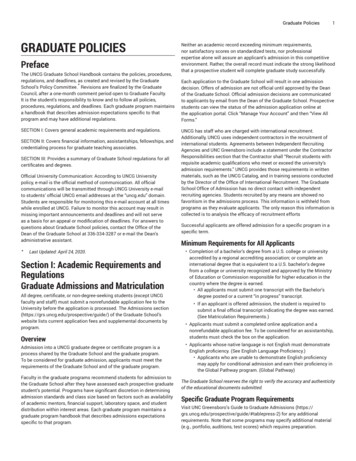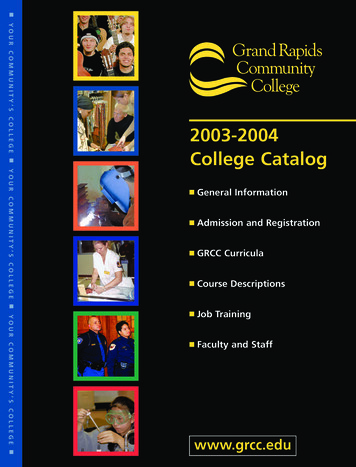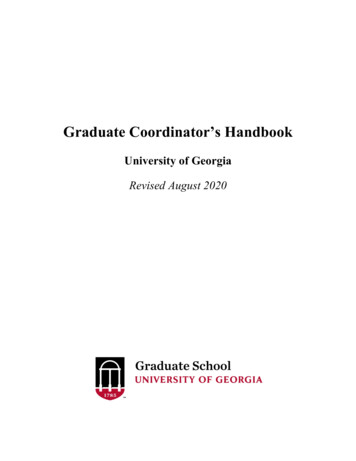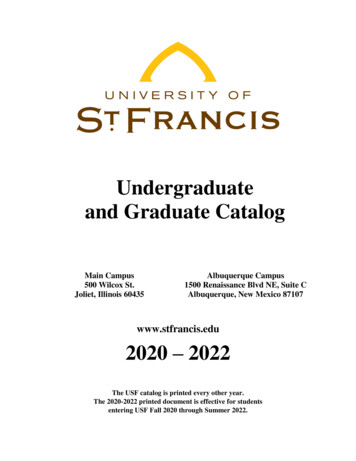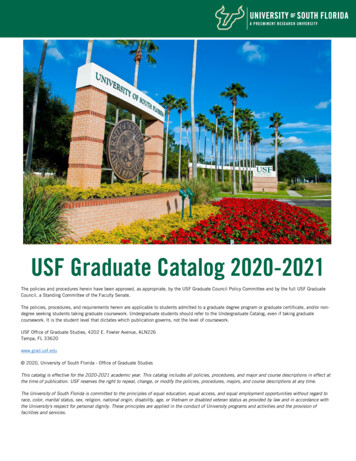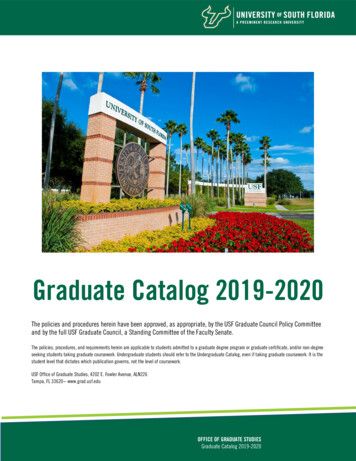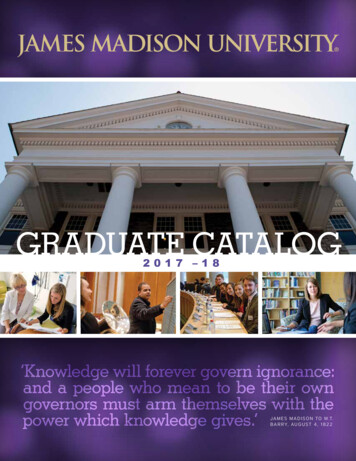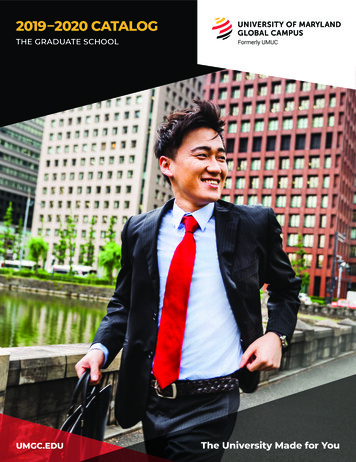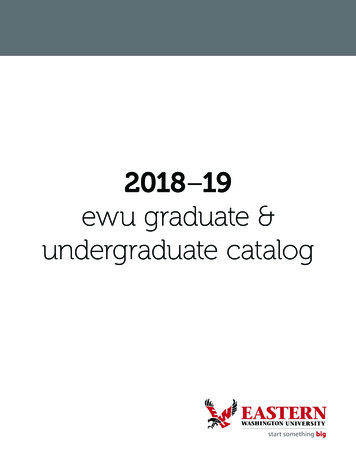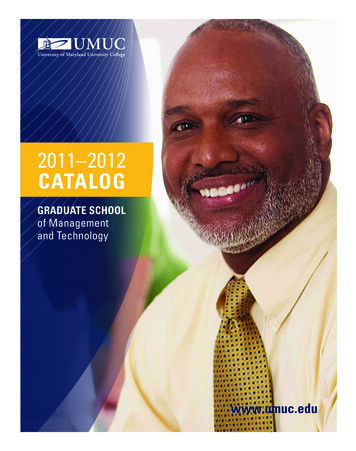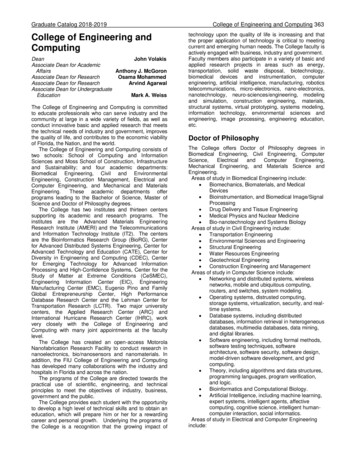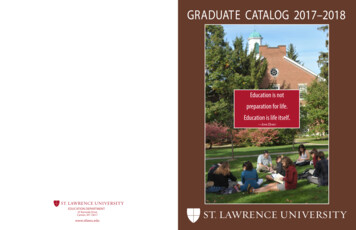
Transcription
GRADUATE CATALOG 2017–2018Education is notpreparation for life.Education is life itself.—John DeweyEDUCATION DEPARTMENT23 Romoda DriveCanton, NY 13617www.stlawu.edu
St. Lawrence UniversityNondiscrimination, Discriminatory Harassment & Sexual Harassment PoliciesContentsGeneral InformationGraduate Study in EducationGraduate Degrees andCertificates OfferedAccreditation, State Approval andRegistrationMaster’s Degree ProgramsOther Graduate Programs of StudyMaster’s Degree Requirements. . .111112Academic Policies andProceduresClassification of StudentsProcedure for Admissionto Graduate StudyAssignment of AdviserFinancial AssistanceAssistance with Certificationand PlacementGeneral Regulations. . . .223334Graduate ProgramDescriptionsEducational Leadership ProgramCounseling and HumanDevelopment ProgramGeneral Studies inEducation ProgramNondiscrimination PolicyGraduate CourseDescriptionsCourses in EducationCourses in EducationalLeadershipCourses in Counseling andHuman Development.14.16.18Graduate Faculty20.Full-time Faculty in EducationFull-time Faculty and Staff TeachingCourses in EducationAdjunct Assistant Professors of EducationAdjunct Faculty in EducationFaculty EmeritiEducation Department StaffContact InformationDepartment of Education.6912Discriminatory Harassment Policy*21315-229-5861Esther OeyCoordinator, Teacher Education ProgramsPeter LaddCoordinator, Mental Health Counseling.Susan DoddCoordinator, School Counseling ProgramsWilliam CollinsCoordinator, Educational Leadership ProgramsErin BasfordAdministrative Associate, Graduate AdmissionsSpecialist, NYS Certification OfficerAll members of the St. Lawrence community are valued equally. We are committed tomulticultural diversity in our faculty, staff, student body and curriculum. Awarenesstraining for students, faculty and staff is designed to eliminate all forms of discrimination.St. Lawrence University subscribes fully to all applicable federal and state legislation andregulations (including the Civil Rights Act of 1964; Title IX of the Educational Amendmentsof 1972; Section 504 of the Rehabilitation Act of 1973; the Americans with DisabilitiesAct; the Age Discrimination in Employment Act (ADEA);the Age Discrimination Act of1975; New York State Human Rights Law; and Part 53, Section 607 of the New York StateEducational Law) regarding discrimination, as well as the Drug Free Workplace Act of 1988.The University does not discriminate against students, faculty, staff, or other beneficiarieson the basis of race, color, gender, religion, age, disability, marital status, veteran’s status,sexual orientation, or national or ethnic origin, or any other category protected by law orregulation, in admission to, or access to, or treatment, or employment in its programs andactivities. Retaliatory action of any kind taken by any employee, student, or beneficiaryagainst any other employee, student, or beneficiary as a result of that person’s seekingredress under this policy is prohibited. St. Lawrence University is an Affirmative Action/Equal Opportunity Employer. For further information contact St. Lawrence University’sVice President for Community and Employee Relations, Vilas Hall, St. Lawrence University,Canton NY 13617, 315-229-5567, lcania@stlawu.edu.It is the policy of St. Lawrence University that all our employees and students should beable to enjoy a work and educational environment free from all forms of discrimination anddiscriminatory harassment, including sexual harassment. St. Lawrence University providesfor the development of a climate of tolerance and pluralism and prohibits expressivebehavior which is demeaning, intimidating or hostile, communicated verbally, physicallyor with other communication device, including telephonic or electronic means. It isexpressly against University policy for any employee or student to engage in discriminatoryharassment which is defined as any demeaning, intimidating or hostile verbal, physical orsymbolic behavior that is based on race, religion, ethnicity, age, gender, national origin,marital or veteran’s status, disability or sexual orientation, or any other category protectedby law or regulation, and has the effect of interfering with a reasonable person’s academicor work performance or of creating, as experienced by a reasonable person, an intimidatingor hostile situation or environment. Such behaviors include, but are not limited to, the useof slurs, epithets, gestures, demeaning jokes or derogatory stereotypes.*Sexual harassment is one form of discriminatory harassment, and is covered by thispolicy. It is expressly against University policy for any employee or student to engagein sexual harassment. A charged atmosphere is often involved in instances of sexualharassment, which is defined as any unwelcome sexual advancement, request for sexualfavors, or other physical or verbal conduct of a sexual nature when:1) submission to such conduct is made either explicitly or implicitly a term or condition ofan individual’s employment or education; or2) submission to or rejection of such conduct by an individual is used as the basis foracademic or employment decisions affecting that individual; or3) such conduct has the purpose or effect of unreasonably interfering with an individual’sacademic or professional performance or creating an intimidating, hostile or offensiveemployment, educational, or living environment.No forms of discriminatory harassment of students or employees will be tolerated. Anyemployee or student will be subject to disciplinary action for violation of this policy, upto and including termination or expulsion. Discrimination and harassment may be foundto be illegal under both state and federal law. In some cases, it may be susceptible toprosecution under criminal sexual law.This policy is not intended to proscribe, and should not limit free discussion of, the meritsof any issue relating to ethnic, racial, religious or other multicultural difference or openinquiry into any material or issue relevant to the academic content of a course.Not all offensive conduct or language that might be derogatory concerning an individualor group necessarily constitutes discriminatory harassment. Whether a specific act does infact constitute discriminatory harassment must be determined on a case-by-case basis inSee inside back cover for the St. Lawrence University Nondiscrimination, Discriminatory Harassment & Sexual Harassment Policieslight of all relevant circumstances.If you believe you have experienced or are experiencing discriminatory harassment,talk to the person or persons who may be responsible for the problem. If that is notpossible, or doesn’t work, speak to someone for help or advice. Any St. LawrenceUniversity employee having a complaint of harassment is urged to notify his or herimmediate supervisor at once. If the complaint is against the immediate supervisor, orif the complainant for any other reason is not comfortable with or is unable to contacthis or her supervisor, the University’s Office of Equity Programs, the Human ResourcesOffice or the Office of Security & Safety may be contacted.If you are a student you may speak to your academic advisor, the chairperson of thedepartment, or any staff member in student life, particularly in residential learning,security, counseling, or the Associate Dean of Student Life.If you are an employee, speak with the human resources office, the vice president ordean of the area involved (academic affairs, admissions and financial aid, businessand finance, communications, information technology, student life, universityadvancement).Formal complaints of alleged discriminatory harassment are heard by theDiscriminatory Harassment Hearing Board, which is described in the StudentHandbook and on the SLU website under Policies or Human Resources as well as aSection 504/ADA Grievance Procedure for complaints relative to those regulations. Formore information about the DHHB or other venues for complaints contact St. LawrenceUniversity’s Vice President for Community and Employee Relations, Vilas Hall, St.Lawrence University, Canton NY 13617, 315-229-5567, lcania@stlawu.edu.Retaliatory action of any kind (such as, but not exclusive to adverse action vis-à-visstanding in employment or student status, adverse decisions re salary, job performanceor student performance, or adverse action taken re opportunity for advancement foran employee or student) taken by any employee (including faculty, department heads,supervisors, and co-workers), student or beneficiary of the University against any otheremployee, student, or beneficiary as a result of that person’s seeking redress throughan appropriate means, including under the procedures of the DHHB, cooperating inany appropriate inquiry in the matter, or otherwise participating in any proceedingsunder the procedures of the DHHB or appropriate University body is prohibited. Anysuch retaliatory action can be the basis for a separate complaint.Any person may also contact outside authorities to file complaints. External agencyrules, or procedures internal to St. Lawrence University, may obviate further internalreview in the event a complainant chooses an external route.For more information about the DHHB consult the SLU Policies website [SLU/Faculty& Staff/Policies] @ http://www.stlawu.edu/policies/index.html For further informationcontact St. Lawrence University’s Vice President for Community and EmployeeRelations, Vilas Hall, St. Lawrence University, Canton NY 13617, 315-229-5567, lcania@stlawu.Rev. Nov. 2009
General Information: Other Graduate Programs of StudyGeneral InformationMaster’s Degree ProgramsGraduate Study in Education atSt. Lawrence UniversityGeneral Studies in Education. This program provides opportunity forlearning about teaching and learning in public and private schoolsand a variety of non-school contexts. Three options are availablewithin the program, all of which lead to the Master of Education(M. Ed.) degree:The department of education at St. Lawrence University offers opportunities for graduate study in education to full-time and part-timestudents. Many course offerings are scheduled for the convenience ofthose who wish to study or complete a graduate-level program whilemaintaining full-time employment in the area.1) An Initial/Professional Certification Option is aligned with thecurrent Regents’ standards to prepare and certify beginningteachers; it also meets the state’s academic requirements forprofessional certification, once the state’s additional testing, workexperience, and mentoring requirements are met. Programs forcertification are available in 7-12 English, Mathematics, SocialStudies, Science (biology, chemistry, earth science, and physics with extension for general science), and Foreign Language(French and Spanish); and in K-12 Art.The department seeks to assist students in constructing knowledge,skills and habits of mind to enhance their own lives and those of thepeople they serve in processes related to teaching, learning, andgrowing on a variety of levels and domains. Because the liberal artsare the foundation for all education, those who educate must exercise,promote and model liberal learning – broad knowledge of fields ofinquiry throughout the disciplines, in-depth knowledge of a specificdiscipline, and specific knowledge and skills in pedagogy. The aim ofthe graduate programs in teaching, counseling and educationalleadership is to extend and enhance students’ knowledge, skills andhabits of mind to the level of professional practice.2) A Professional Certification Option, open to students who already possess a New York State initial teaching certificate in anyof the areas listed above. Completion of the program will qualifythem for professional teaching certification in New York once anyadditional state testing and work-related requirements are met.Students are advised to make an early decision if they intend to pursue a program of study for certification or for a master’s degree sothat they will receive the full benefit of a planned program with anassigned advisor. Students seeking certification through the department’s programs in the fields of teaching, school leadership andschool counseling should make formal application for graduate studyfollowing the same procedure as degree candidates. Application foradmission must be submitted prior to the completion of 12 semesterhours of graduate study.3) A Non-certification Option is available to students who are notseeking certification as a public school teacher.All three options provide students the opportunity to plan a part oftheir own curriculum with faculty advice in accordance with theirindividual interests and needs.Counseling and Human Development. This program providesopportunity for learning about working with clients in schools,colleges and universities, agencies, clinics and related counselingservices. Two degree options are available:Graduate Degrees andCertificates Offered1) a 48-semester-hour Master of Education (M. Ed.) in SchoolCounseling leading to a provisional New York State certificateas a school counselor. For students initially certified in teaching,completion of the school counselor concentration of the M. Ed.in Counseling and Human Development is available as a route toprofessional teaching certification as well, provided that the individual is issued a provisional certificate as a school counselor.St. Lawrence University offers the Master of Education (M.Ed.) degreein three separate programs: general studies in education, counselingand development, and educational leadership. All three feature options leading to public school certificates.In addition to the M.Ed. Programs, the University offers the Master ofScience (M.S.) in Mental Health Counseling, a licensure-eligible program. The University also offers three non-degree programs, leadingto 1) a Certificate of Advanced Study (C.A.S.) in Educational Leadership,2) a Certificate of Advanced Study (C.A.S.) in School Counseling, and3) a non-degree option leading to initial teaching certification in NewYork State. further information about all of these programs can befound in subsequent sections of this Graduate Catalog.2) a 60-semester-hour Master of Science (M. S.) in Mental HealthCounseling that meets all academic requirements for New YorkState licensure as a mental health counselor in agencies andclinics. Additional supervision beyond the master’s degree isrequired for eventual licensure.Educational Leadership. This program provides opportunity to learnabout administration and leadership in educational systems. Twooptions are available, both of which lead to a Master of Education (M.Ed.) degree:Accreditation, State Approval and RegistrationSt. Lawrence University is accredited by the Middle States Associationof Schools and Colleges. The University’s undergraduate and graduate-level teacher education programs and the educational leadershipprograms are nationally accredited by the Council for Accreditation ofEducation Preparation (TEAC) for a period of seven years, effectivebetween November 8, 2013 and November 8, 2020, in accordancewith requirements of the New York State Board of Regents. Allprograms described in this Graduate Catalog are registered andapproved by the New York State Education Department.1) a 39-semester-hour School Building Leader Initial CertificationOption. For students initially certified to teach in New York State,completion of the School Building Leader Initial Certificationoption is available as a route to professional certification as well,provided that the individual is issued an initial certificate as aschool building leader.2) a Non-certification Option for individuals who are not seekingcertification for work in public schools.1
Other Graduate Programs of Studyulation for the second master’s degree or the certificate of advancedstudy, the advisor will determine which courses are acceptable fortransfer from the first degree. The courses to be transferred musthave been completed within 10 years prior to the date of acceptancein the new program. (Up to six additional semester hours of approvedgraduate study may be transferred from other accredited institutions during the six-year time period of the program for the secondmaster’s degree or certificate of advanced study.) Note: For studentsentering the M. S. in Mental Health Counseling program after completing the University’s M. Ed. in School Counseling, up to a maximumof 24 semester hours will be accepted toward the 60-semester-hoursecond degree.Three other graduate-level programs of study are offered atSt. Lawrence. They are also described in detail in subsequent sectionsof this publication.Certificate of Advanced Study (C.A.S.) in Educational Leadership.Two post-master’s options focus on advanced skill development ineducational leadership:1) a 33-semester-hour Combined School Building Leader/SchoolDistrict Leader Option for candidates who already hold amaster’s degree in education, and2) a 21-semester-hour School District Leader Option for candidates who already hold a master’s degree in Educational Leadership and are certified as a School Building Leader. Uponcompletion of a minimum of 60 semester hours of graduatestudy, students will be awarded the C.A.S. in EducationalLeadership from St. Lawrence University.Residence Requirements. Candidates are encouraged to take all oftheir course work at St. Lawrence University. A minimum of 27 hoursof work must be done at St. Lawrence University if a student is tomeet the minimum requirements for the M.Ed. degree; a minimumof 18 hours of work must be completed at St. Lawrence for a secondM.Ed. degree; a minimum of 15 semester hours must be completed atSt. Lawrence for a Certificate of Advanced Study. Graduate studentsare not required to live on campus for any period of time.Certificate of Advanced Study (C.A.S.) in Counseling. This postmaster’s program focuses on advanced skill development in schoolcounseling. The certificate requires 12 approved graduate hoursbeyond the 3
Equal Opportunity Employer. For further information contact St. Lawrence University’s Vice President for Community and Employee Relations, Vilas Hall, St. Lawrence University, Canton NY 13617, 315-229-5567, lcania@stlawu.edu. Discriminatory Harassment Policy* It is the policy of St. Lawrence Un
